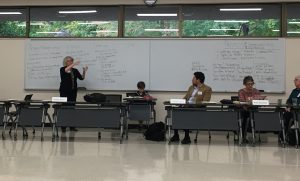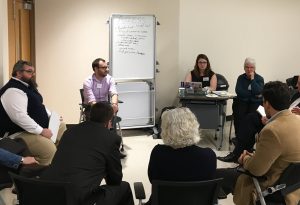
Frayda Bluestein from the UNC School of Government leads a discussion during the second plenary session.
Many law enforcement agencies across the country have implemented or are considering body-worn camera (“BWC”) programs as a means to improve policing and promote transparency. Despite the ubiquity of these programs, issues surrounding the use of such cameras continue to arise. While public debate has largely focused on the tension between police accountability and privacy, little work has been done to address the practical needs of law enforcement and the media, particularly the retention, redaction and release of BWC video to the public.
To address this deficiency, the UNC Center for Media Law and Policy convened an invitation-only workshop last weekend. The workshop was a supplement to the North Carolina Law Review’s 2017 symposium “Badgecams as Data and Deterrent: Law Enforcement, the Public, and the Press in the Age of Digital Video.” It was organized to address the practical issues associated with the implementation of police body-worn camera systems, with the goals of ascertaining areas of agreement, identifying issues that would benefit from research, and developing best practices for police departments and the media.
We had a great group of experts in attendance, all with varying perspectives on BWCs. The group consisted of experts on law enforcement, news gathering, privacy, and public access, including seven police officers, two North Carolina Representatives, five attorneys, multiple access and reform advocates, and a dozen academics from across the country.
The workshop was structured to promote open and honest discussion among the attendees and was comprised of two plenary sessions with smaller breakout working groups. In the plenary sessions, the participants identified the major issues surrounding BWC usage based on a lifecycle framework developed by UNC School of Law professor Richard Myers. Attendees then narrowed the list of potential topics to four main areas of interest — creation, access, use, and privacy — that were the subject of the breakout sessions.

Adam Marshall from the Reporters Committee for Freedom of the Press facilitates a breakout session on public access to BWC videos.
Not surprisingly, the breakout sessions did not produce many points of consensus. Nevertheless, we thought the workshop was a success. Indeed, it is rare for privacy advocates, policymakers, and law enforcement sit down together and talk about issues surrounding the use of BWC systems. The workshop allowed participants to hear from those working with BWC on the frontlines and to identify gaps in resources, research, and policy. We hope that the connections made and the conversations that started at the workshop will prove to be beneficial for everyone who came.
We are currently drafting a white paper that will describe in greater the detail the issues that were raised at the workshop. The Center is thankful for all of those who participated, and we look forward to continuing the conversation!

super info
meilleur site